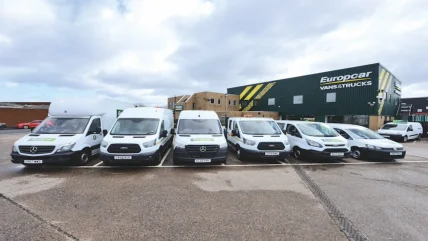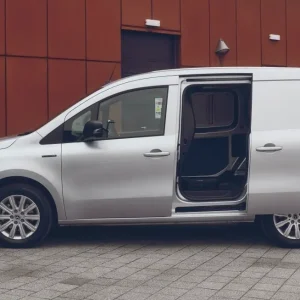
With no end as yet to the coronavirus pandemic, and the prospect of the UK leaving the EU without a trade deal, economic uncertainty abounds.
As a consequence van operators may be wary of committing themselves to a contract hire agreement in case they are hit by a downturn in work. If that happens then they may fear that they will be saddled with idle vehicles they cannot get rid of unless they are willing to pay hefty early termination penalties.
However, they may be willing to rent.
“A lot of businesses are uncomfortable about tying themselves into a contract hire deal and want a more flexible arrangement,” says Stuart Russell, light commercial vehicle sales director at Europcar Vans and Trucks. “They’re worried about what will happen if there is a second wave of Covid-19 and the economy ends up locked down for three months.”
If they have rented their vans then all they need to do is send them straight back to the rental company. “That’s what a lot of our customers did at the height of the pandemic and there were no gripes from us about it,” says Northgate Vehicle Hire sales and marketing director Neil McCrossan.
Rental’s appeal in uncertain times is helping to keep van rental fleets buoyant. Europcar’s has expanded from 6,500 vehicles at the start of the pandemic to 9,000 at the time of writing. Northgate’s sits at a hefty 50,000, and seems unlikely to shrink.
According to a survey of small businesses conducted for Avis Vans, 25% of them opted to introduce a delivery or mobile service of some kind when lockdown restrictions obliged them to shut their premises. Almost half of them are looking to continue operating in this way, which is good news for van rental, Avis believes.
“Rental, whether short, medium, or long-term, provides the ideal mobility solution for those looking for commercial vehicles without the ties of lengthy contractual terms, large upfront payments, or maintenance fees,” says Avis Budget Group managing director, UK and Scandinavia, Nina Bell.
Businesses that rent light commercials will often want to keep them for several months, and will seek a rental rate that reflects their commitment. What they cannot expect to do, however, is assure a rental company that they will take a van for six months, start paying a discounted six-month rental rate, then return it after a fortnight – which they are perfectly entitled to do – without incurring charges of some kind.
Says Europcar’s Russell: “Under Flex+ what we do is ask for customers to commit to a minimum period of three months. After that, vehicles can be returned at no cost.
“If you sign up to Flex+, however, and send the van back after a week then you will be billed for the entire three months.”
Northgate Vehicle Hire has become well-known for pioneering flexible long-term rental packages.
If a business commits to renting vans from the company for, say, three years, but elects to return them after two, then there is nothing to prevent it from doing so.
However, it will be asked to pay the difference between the three-year rate (which will be higher) and the two-year rate (which will be lower).
“We tell customers that is the situation in advance,” says McCrossan.
It is not the case that rental companies such as Northgate only have plain white light commercials on their fleet in entry-level trim, he adds: “Tell us what you want and we’ll specify the vans accordingly and supply them to you.”
Russell adds: “If a customer says he wants load area racking, a tow bar, a roof-mounted beacon and the van sign-written, and he says he’ll take it for 18 months, then we’ll arrange all that. If he sends the vehicle back early, however, then we’ll charge him for the extra equipment.”
Leasing specialists argue that the monthly rate a business pays if it rents a van is almost always going to be higher than the contract hire rate. McCrossan does not deny this is the case, but contends that the percentage increase rental attracts can be measured in single digits.
In some cases it may be as little as 2%, Russell adds, and “customers need to factor in the benefits that are available to them”.
He continues: “Remember that we maintain the van, and that includes replacing worn tyres. We provide 24/7 breakdown cover and replacement vehicles too.”
Conscious of the challenge flexible rental presents, leasing companies are fighting back.
Leasys, the contract hire division of Fiat Chrysler Automobiles, has come up with a pay-as-you go package for Fiat Professional’s Doblo Cargo under the Leasys Miles banner. It involves monthly payments plus a per-mile charge. The number of miles the vehicle covers is recorded by onboard black box technology and the customer is billed monthly. The black box does not track the van’s whereabouts, Leasys stresses.
If a business wants to acquire a new Doblo Cargo L1 diesel 1.3 80 on this basis then it will pay an initial instalment of £149 followed by 47 monthly payments of £149 plus a charge of 25p a mile. The first 500 miles come free.
The product is aimed at local tradespeople such as plumbers and electricians who tend not to cover high mileages, says Leasys UK managing director Sebastiano Fedrigo. Their light commercial vehicles often spend much of the day parked outside people’s houses while work is being carried out inside.
“If you do 15,000 to 20,000 miles a year then it’s not for you,” he comments.
It is likely to appeal to customers who cannot accurately predict how much work they will be taking on during the coming months given the current unpredictable business climate, he adds. As a consequence they are looking for agreements that include some flexibility, at least so far as the mileage element is concerned.
While it involves a four-year commitment, the £149 monthly rate is comparatively modest. It will not increase if there is a Covid-19 spike and the van has to be parked up temporarily without turning a wheel.
“With further lockdowns a possibility few small businesses are in a position to commit to traditional leasing arrangements, yet still need access to vans in order to function,” says Fedrigo, who was formerly Fiat Professional’s UK country manager. “This new deal is the perfect solution,” he insists.
If Leasys Miles is successful then it may be extended to other models in the Doblo Cargo range, and possibly to the larger Talento and Ducato.
Leasys Miles certainly looks like a good deal for low-mileage users willing to sign up for 48 months, a period which will hopefully extend way beyond the Covid-19 crisis. Bear in mind though that if you have to terminate the agreement early then you may face a penalty equivalent to 50% of the remaining monthly payments, so think carefully before you commit yourself.
Uncertainty is prompting some companies that previously bought their vans outright to lease them instead because they want to preserve their capital, says Paul Lippitt, principal consultant at Lex Autolease. It has 100,000 light commercials on its books.
Lippitt believes that rental has its place if a firm needs extra vans to deal with a short-term peak in demand, but argues that there is a strong case for obtaining the core fleet under a contract hire agreement, sometimes referred to as an operational lease.
It is a view shared by Simon Cook, light commercial vehicle leader at Arval UK.
“Leasing offers customers the ability to enjoy a fixed financial cost,” he argues. “Furthermore, if they have taken what we call an Arval Total Care package, which includes service, maintenance and repair, then full budgeting is possible.
“It takes the unexpected financial variables and worry out of obtaining what is an essential business tool.”
Nor should firms that obtain vehicles under contract hire from a reputable lessor fear that they will be charged for every minor scratch and stone chip when they are sent back, says Lippitt.
“We always take fair wear and tear into account,” he stresses. “We don’t expect them to be returned in showroom condition.”
Lippitt points out that such agreements can be of different durations, with two to three-year deals covering some vans, and four to five-year deals covering others.
This means that if there is a downturn and work falls off, then the rental vehicles can be sent back immediately. Those vehicles subject to leases that are about to expire can be returned to the leasing company at the same time, hopefully without a penalty being incurred, with those remaining enabling the fleet to keep functioning.
“If you pursue this approach then you can minimise any early termination costs,” he says.
“Remember that if you rent a van then it may not be built to the exact specification you require and may not be equipped with a suitable telematics system,” Lippitt says. Arval’s Cook adds: “Where a business’s vehicle needs are more complex, or specific to a particular role with modifications required, then long-term rental may not always be the best option.”
Verdict? Long-term rental and contract hire both have their advantages, but be careful before you commit yourself to either route. Get it wrong, and you will discover that neither is wholly penalty-free.





